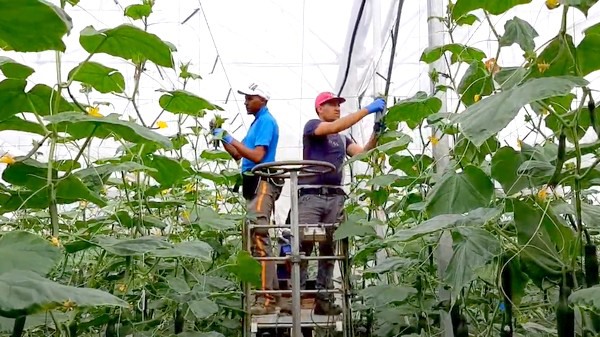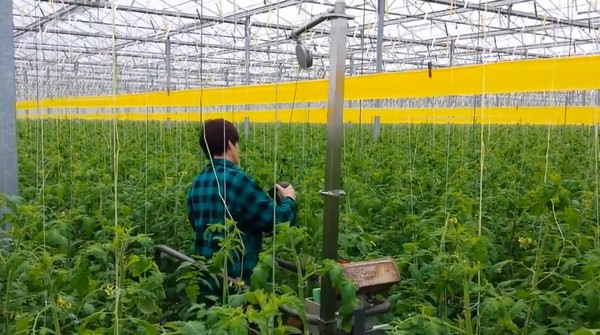Ka-chunk. Ka-chunk. Ka-chunk. A soft and rhythmic sound arises from the pipe rail trolley in a cucumber greenhouse in Germany. The same sound can be heard in a Mexican tomato greenhouse, where a worker on stilts stands between the tomato plants. And also in Spain the rhythm is found, in pepper greenhouse. It’s the sound of the TOM-system, used to tie plants mechanically to the wire with a small metal ring. Enabling a worker to clip more than 2000 plants per hour, it provides a solution to the lack of labor available in the greenhouse industry.
“When you make a mistake and the crop falls down, there’s effects immediately. Since the stakes are high, people are reluctant to start with our system, but once they start, they hardly ever go back.” Speaking is Alberto Lizarraga with Agrifast, the company that developed the TOM-system almost a decade ago. Ever since, growers from all over the world have started tying their crops to wires automatically with a small metal ring.
Labor scarcity
Since labor scarcity has been a great challenge already and the pandemic only put more pressure on this, automation solutions are high in demand. “Twisting crops to the wire is an activity that needs a certain skill and it takes time for workers to get the hang of it.
Plastic clips are an alternative, and so is the TOM-system. We see that the trend in the market to reduce plastics is stirring the popularity of the TOM-system,” Alberto adds. “The galvanized steel used for the clips can remain in compost, since either a magnet can remove it or it can be composted with the old plants. But more than only the rising cost of composting product that’s contaminated with plastic, there’s also the general attention towards sustainability The TOM system and bio twines are the perfect marriage to not use plastics at all.”

How to increase the clipping speed even further?

Clipping using a weight stabiliser
Bio-twine
This sustainable trend has also put new challenges to the Agrifast team. If a client wants to use the system in a bio-crop, with bio-twine, they will quickly develop a clip that’s not galvanized. “And we adjusted the software for the tool to adapt to biotwine,”says Alberto. “There are many types of bio-twines, but in general they are slightly thicker than plastic twines, which could cause issues when your are closing them. With special software, the clips close less close to the twine. This way it holds the weight and it avoids damaging the twine.”
Over the last years the tool has also been updated regularly. Especially since the use of disinfectants like Virkon is growing, the team with Agrifast puts attention to improving the tool so the liquid will not affect it too much. “Just like any tool used in the greenhouse, it can and has to be disinfected,” Alberto says.
It’s for situations like these why the pandemic might cause for a higher demand for automation solutions, yet still provides challenges for the Agrifast team. “If we can get into the greenhouse with a client, we can learn from the challenges growers deal with. With 5 different positions to close the wire, 1000 types of twines and many different types of varieties and crops, we can improvise and innovate a lot, but we need to know what growers are looking for.” It’s also why in addition to doing business with the greenhouse manager, one of the Agrifast team members always tries to get in the greenhouse with the workers once the system has been purchased. “The system is easy to use, but it is important to use it in the correct way. We have lots of video material now and can show people how to do it digitally, but still we want to be in the greenhouse with the users of our product.”
Local network
Over the last years they invested into a network of local dealers and partners to help enable local support and they are still on the lookout for new ones. “In addition to annual maintenance, something might happen to the tool and since the effects on the cultivation works are high, we want to respond rapidly. From Spain we can help with UPS and send spare parts and tools in 24 or 48 hours, but for other countries that gets more difficult, especially with customs clearance. That’s why we’re focusing on broadening our network in the countries where we currently have clients, but no official dealers.”
For more information
Agrifast
Alberto Lizarraga
alberto.lizarraga@agrifast.es
http://www.thetomsystem.com/
